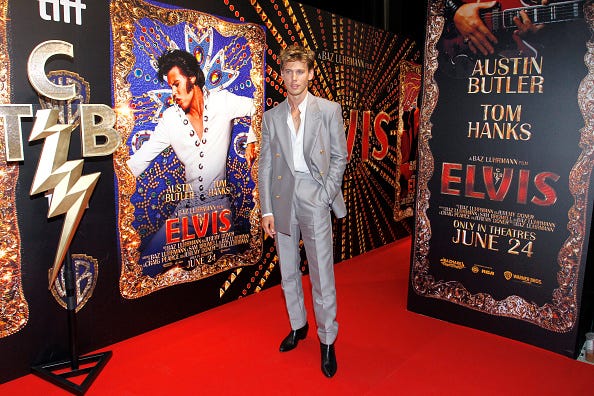
Austin Butler, the 30-year-old actor who plays Elvis Presley in the new biopic Elvis, was so good in the role that there were times when his performance actually distracted from the story.
As I watched Elvis, I wondered if that was really Austin Butler’s voice - speaking and singing - it was his voice.
From all that I have seen and heard from the real Elvis Presley, Austin Butler perfectly captured the general tone and pattern of Elvis’s speech. Butler did all of the singing in the early part of Elvis’s life. Through a special recording technique, Butler’s voice was matched with the actual recordings of Elvis after 1968, but Butler’s voice was still part of the finished product.
With such an accurate imitation of Elvis’s voice, I knew that the actor had spent time studying Elvis. Butler spent a year working with a voice coach before beginning production. In a scene with 600 extras in the audience, Butler admitted that he was initially embarrassed and afraid.
However, he used what he learned about the real Elvis to help him conquer his fear. Butler said in an interview, “I learned that Elvis was really a shy kid. He would ask people to turn around when he played guitar and turn off the lights in the room.” Butler realized, “That’s how I feel.”
No doubt Butler channeled the shyness of the real Elvis and was able to convert that into his amazingly authentic depiction of the King.
Actor Tom Hanks’ portrayal of Col. Tom Parker, who launched Elvis’s career and remained an integral part of every aspect of Elvis’ life, helped us come to know the evil genius behind the phenomenon that was Elvis Presley. Not much was known about Col. Parker so Hanks had an open door to create an image that we believe was accurate. Col. Parker was the best - and the worst thing to happen to Elvis.
In her part as Priscilla Presley, actress Olivia DeJonge was convincing in her portrayal of a young woman who was in love to a woman who became so disgusted with Elvis’s drug use and lifestyle that she left him and took their daughter, Lisa Marie, with her. In scenes that followed, Austin Butler showed how devastating that situation was to Elvis.
Butler so resembled Elvis in both his visual appearance and his voice that there was no need to use vintage visuals of the real Elvis. It wasn’t until near the end of the movie that we saw the real Elvis, and that provided a touching reflection on the man we come to know in the movie.
In the beginning of the movie - I was intrigued by the relationship Elvis had with Black artists - B.B. King, Fats Domino, and others. During a joint press conference with Fats Domino, Elvis was referred to as the King, but he quickly redirected the title of the King to Fats - whom he said was the “real King.”
When Elvis's father was sent to jail, he and his family were sent to live in housing provided for whites that was in a Black neighborhood in Memphis. It was young Elvis’s fascination with a Black religious revival that taught him to express himself on stage.
I never equated Elvis with bridging Black and white America at a time when integration was being introduced and condemned by many. Many thought Elvis was Black when first hearing him on the radio, and he seemed extremely sympathetic to
the inequality in Black America. And looking back on Elvis’s gyrating pelvic moves on stage, it is obvious that Elvis was inspired by the passionate dancing and animation of Black revivals.
From the beginning of his career, Elvis was a rebel - an innovator - and he wasn’t afraid to defy the Colonel or conventional wisdom at the time and be true to himself. Being true to oneself was one of the strong messages in the movie.
Before his death, Elvis was a bloated exaggeration of his former self - many sympathized, but many were also critical of the King for allowing himself to get that way.
In his last performance on stage, Elvis had difficulty standing, and his health was in rapid decline. But sitting at a piano with a bandmate holding the microphone - Elvis belted out an emotional version of “Unchained Melody,” a Righteous Brothers’ hit. It was as if Elvis knew the end was near and wanted that song at that moment to be something people remembered.
The movie offered an interesting reason for his downfall. Tom Hanks, as Col. Parker, said that it was his love for his fans that killed Elvis. A theme through the movie was Elvis’ desire to satisfy his fans. It can now be considered that it was his love and devotion to his fans that led to the drug use that allowed him to satisfy the demands of being one of the world’s greatest superstars.
